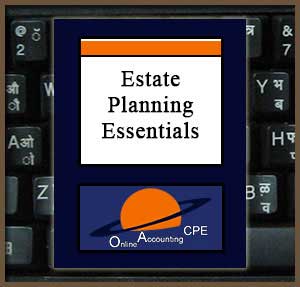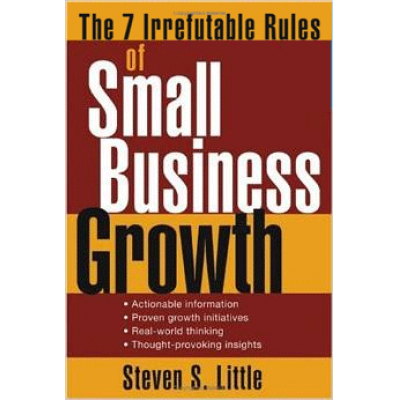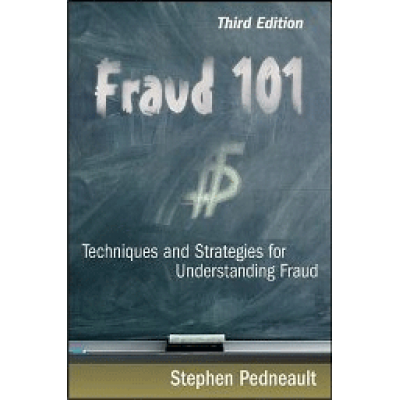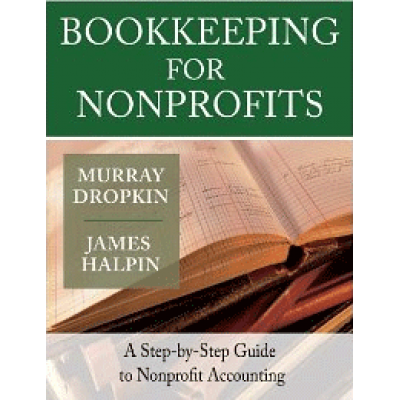Estate Planning Essentials 2020 - 12 CPE Credit Hours
Just the facts ma'am; just the estate planning facts." Designed to give a quick overview of estate planning essentials, this course surveys wills, living trusts, gifts, marital property, and probate avoidance. Will and trust types are examined in the context of general estate and gift taxation. Designed to eliminate estate problems and death taxes, the emphasis is on practical solutions that are cost effective. Talk about having it all in an overview course - there is even a quick review of immediate postmortem death tax planning and filling out the Form 706.
Completion Deadline & Exam: This course, including the examination, must be completed within one year of the date of purchase. In addition, unless otherwise indicated, no correct or incorrect feedback for any exam question will be provided.
Course Level: Overview. This program is appropriate for professionals at all organizational levels.
Field of Study: Taxes
Prerequisite: General understanding of federal income taxation.
Advanced Preparation: None
Learning Assignments & Objectives
As a result of studying each assignment, you should be able to meet the objectives listed below each assignment.
ASSIGNMENT SUBJECT
Chapter 1 Estate Planning
At the start of Chapter 1, participants should identify the following topics for study:
* Build, preserve & distribute
* Legal documents
* Estate planning team
* Estate administration
* Transfers within probate
* Transfers outside probate
* Transfers using a trust
* Special planning tools
* Facts
Learning Objectives
After reading Chapter 1, participants will be able to:
1. Identify basic estate planning elements recognizing the importance of well-drafted legal documents and specify the key team participants including their roles in the estate planning process.
2. Determine the major steps in the probate process, identify ways to make transfers outside the probate system including the use of a trust, specify estate tax techniques that save death taxes while retaining maximum control, and identify estate-planning facts.
After studying the materials in Chapter 1, answer the exam questions 1 to 6.
ASSIGNMENT SUBJECT
Chapter 2 Estate & Gift Taxes
At the start of Chapter 2, participants should identify the following topics for study:
* Taxable estate
* IRS valuation
* Estate tax return & payment
* Tax basis for estate assets
* Generation-skipping transfer tax
* Application of gift taxes and valuation
* Gift tax annual exclusion
* Gift tax marital and charitable deductions
* Gift tax advantages and disadvantages
* Shifting income & gain
Learning Objectives
After reading Chapter 2, participants will be able to:
1. Identify potential death taxes including federal estate tax as it applies to various size estates, specify the principal taxes that impact death taxation, and determine the expiration of the death tax credit.
2. Determine what constitutes a taxable estate under §2501 specifying what assets are included in a gross estate using basic categories of property and transfers.
3. Specify estate deductions allowed under federal estate tax law stating their tax advantages and disadvantages.
4. Determine the value of a decedent’s assets using permitted elections, recognize the use of Form 706 to pay any estate tax due, select the tax basis of estate assets stating how common transactions affect property basis under §1014.
5. Recall the advantages of gift planning including estate reduction recognizing the impact of the GST, specify the steps to compute gift tax identifying the gift tax exclusion amount, and determine the value of gifts including those that are split.
6. Identify the various gift tax exclusions, specify the tax treatment of below-market loans, recall the gift tax marital deduction requirements, determine the tax consequences of giving various assets specifying factors to consider when gifting, and recognize the use of Form 709 to compute and pay federal gift tax.
After studying the materials in Chapter 2, answer the exam questions 7 to 26.
ASSIGNMENT SUBJECT
Chapter 3 Wills & Probate
At the start of Chapter 3, participants should identify the following topics for study:
* Provisions of wills
* Requirements of wills
* Executors and guardians
* Types of wills
* Title implications
* Changes to a will
* Advantages of a will
* Simple will
* Probate pros and cons
* Probate avoidance
Learning Objectives
After reading Chapter 3, participants will be able to:
1. Specify types of wills citing the functions a will can perform, identify types of bequests, determine the duties of executors and guardians, and recall ways to hold title and their tax ramifications.
2. Identify advantages of a properly drafted will, determine the distribution flow of simple wills, and specify the pros and cons of probate proceedings.
After studying the materials in Chapter 3, answer the exam questions 27 to 32.
ASSIGNMENT SUBJECT
Chapter 4 Trusts
At the start of Chapter 4, participants should identify the following topics for study:
* Purpose of trusts
* Common elements of trusts
* Types of trusts
* Living trusts
* Income tax & trusts
* Gift tax & trusts
* Estate tax & trusts
* Identification, recital & property transfer clauses
* Income and principal & revocation and amendment clauses
* Trustee & trust termination clauses
Learning Objectives
After reading Chapter 4, participants will be able to:
1. Identify the relationship of parties in a trust, reasons to establish a trust, and types of trusts specifying their estate planning function.
2. Specify recommended living trust provisions, identify the application of gift and income tax including the use of a grantor trust and an unlimited marital deduction, and determine what constitutes an “A-B” and “A-B-C” trust format.
After studying the materials in Chapter 4, answer the exam questions 33 to 42.
ASSIGNMENT SUBJECT
Chapter 5 Post-Mortem Planning & Tax Return Requirements
At the start of Chapter 5, participants should identify the following topics for study:
* After death planning
* Federal returns
* Decedent’s estate tax
* Preparation of Form 706
* Estate income tax return
* Filing requirements of decedent’s final income tax return
* Included income
* Exemptions & deductions
* Filing the gift tax return
* Special applications & traps of the gift tax return
Learning Objectives
After reading Chapter 5, participants will be able to:
1. Identify tax and legal title formats naming differences among these entity formats by:
a. Specifying the advantages and disadvantages of holding property individually and through a sole proprietorship or a corporation stating how to avoid associated title pitfalls;
b. Selecting primary groups of C corporations specifying the estate-planning problems associated with each; and
c. Recalling the advantages that partnerships can have over corporations.
2. Determine S corporation rules stating tax advantages and disadvantages and also specify disadvantages and advantages of incorporating a farm.
3. Identify title holding benefits of trusts, co-tenancy, partnerships, and limited liability companies and the tax characteristics of each.
4. Specify types of retirement plans used to provide lifetime benefits to a business owner and to employees, identify how title can be held on behalf of minors and the tax treatment of custodianships, and recall the tax treatment of a probate estate.
After studying the materials in Chapter 5, answer the exam questions 43 to 61.







